 This essay provides an in-depth exploration of the term 'cisgender', a relatively recent addition to the lexicon of human identity. It begins with a clear definition of 'cisgender', tracing its etymological roots to the Latin prefix 'cis-'. The historical emergence of the term in academic discourse during the late 20th century is discussed, highlighting its role in challenging unspoken assumptions about gender norms. The essay further examines the expanding usage of 'cisgender' across various disciplines, including sociology, psychology, and linguistics.
This essay provides an in-depth exploration of the term 'cisgender', a relatively recent addition to the lexicon of human identity. It begins with a clear definition of 'cisgender', tracing its etymological roots to the Latin prefix 'cis-'. The historical emergence of the term in academic discourse during the late 20th century is discussed, highlighting its role in challenging unspoken assumptions about gender norms. The essay further examines the expanding usage of 'cisgender' across various disciplines, including sociology, psychology, and linguistics.
 Let's explore the Teleological Argument, a philosophical proposition that posits the existence of a divine Designer based on the perceived order and complexity in the universe. Drawing from the works of notable proponents, the paper delves into the intricacies of the argument, its historical context, and its influence across various religious and philosophical domains.
Let's explore the Teleological Argument, a philosophical proposition that posits the existence of a divine Designer based on the perceived order and complexity in the universe. Drawing from the works of notable proponents, the paper delves into the intricacies of the argument, its historical context, and its influence across various religious and philosophical domains.
The paper concludes with a reflection on the importance of critical thinking and open dialogue in discussions about the Teleological Argument.
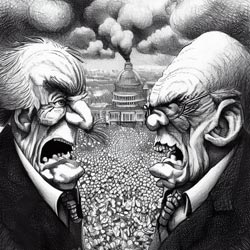 This paper presents a comprehensive argument for the implementation of stricter gun control measures in the United States. Drawing upon historical context, constitutional interpretation, and empirical evidence, it argues that while the Second Amendment protects the right to bear arms, it does not preclude the necessity for sensible gun control measures to protect public safety and prevent gun violence. The paper acknowledges opposition arguments, including the use of firearms for self-defense and concerns about government overreach, but counters these with evidence of escalating gun violence rates and the need to prioritize the rights to life, liberty, and personal security.
This paper presents a comprehensive argument for the implementation of stricter gun control measures in the United States. Drawing upon historical context, constitutional interpretation, and empirical evidence, it argues that while the Second Amendment protects the right to bear arms, it does not preclude the necessity for sensible gun control measures to protect public safety and prevent gun violence. The paper acknowledges opposition arguments, including the use of firearms for self-defense and concerns about government overreach, but counters these with evidence of escalating gun violence rates and the need to prioritize the rights to life, liberty, and personal security.
 This informative essay provides an in-depth exploration of the multifaceted issue of comprehensive immigration reform, with a particular focus on the diverse demographics involved. Each demographic, from women to children, from the elderly to those with disabilities, from indigenous peoples to racial and ethnic minorities, and many others, faces unique challenges in the immigration process. These challenges, along with potential solutions, are discussed in detail.
This informative essay provides an in-depth exploration of the multifaceted issue of comprehensive immigration reform, with a particular focus on the diverse demographics involved. Each demographic, from women to children, from the elderly to those with disabilities, from indigenous peoples to racial and ethnic minorities, and many others, faces unique challenges in the immigration process. These challenges, along with potential solutions, are discussed in detail.
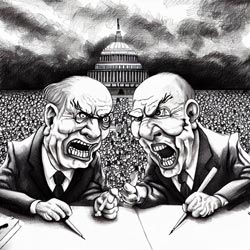 In the crucible of our collective consciousness, the issue of drug policy has been forged, shaped, and reshaped. This paper, a testament to this ongoing discourse, advocates for a radical shift in our approach: the decriminalization of all drugs and the reframing of drug use as a healthcare issue rather than a crime. Drawing on a chorus of voices from across the globe, it weaves together a tapestry of evidence, from the experiences of countries that have decriminalized drugs to the potential benefits of a healthcare approach.
In the crucible of our collective consciousness, the issue of drug policy has been forged, shaped, and reshaped. This paper, a testament to this ongoing discourse, advocates for a radical shift in our approach: the decriminalization of all drugs and the reframing of drug use as a healthcare issue rather than a crime. Drawing on a chorus of voices from across the globe, it weaves together a tapestry of evidence, from the experiences of countries that have decriminalized drugs to the potential benefits of a healthcare approach.
 This paper critically examines the concept of 'school choice' and its implications for public education. Drawing on the philosophy of utilitarianism, it argues that while school choice may seem appealing on the surface, it ultimately undermines the public education system and exacerbates educational inequities. The paper acknowledges opposing viewpoints, including Republican support for school choice, religious arguments, and anti-public school sentiments. It then highlights the virtues of public education as a social safety net and a promoter of civic and cultural values.
This paper critically examines the concept of 'school choice' and its implications for public education. Drawing on the philosophy of utilitarianism, it argues that while school choice may seem appealing on the surface, it ultimately undermines the public education system and exacerbates educational inequities. The paper acknowledges opposing viewpoints, including Republican support for school choice, religious arguments, and anti-public school sentiments. It then highlights the virtues of public education as a social safety net and a promoter of civic and cultural values.
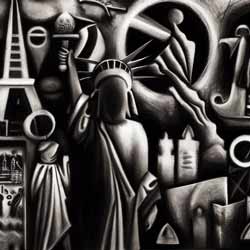 This discourse endeavors to illuminate the pressing issue of immigration reform in the United States. It critically examines the multifaceted problems that plague our current immigration system, from legal complexities and inefficiencies to inhumane policies and political polarization. Acknowledging the concerns of those who oppose reform, it presents a robust counter-argument grounded in the principles of utilitarianism, pragmatism, and compassion.
This discourse endeavors to illuminate the pressing issue of immigration reform in the United States. It critically examines the multifaceted problems that plague our current immigration system, from legal complexities and inefficiencies to inhumane policies and political polarization. Acknowledging the concerns of those who oppose reform, it presents a robust counter-argument grounded in the principles of utilitarianism, pragmatism, and compassion.
 In this discourse, I undertake a rigorous examination of Texas Senate Bill 1515, a legislative proposal mandating the display of the Ten Commandments in public educational institutions. Drawing upon the intellectual contributions of constitutional scholars, authorities on religious freedom, and esteemed philosophers, I present a robust refutation of the bill. I contend that the bill, in its current form, could potentially infringe upon the cherished principles of religious liberty, individual autonomy, and the separation of ecclesiastical and state affairs.
In this discourse, I undertake a rigorous examination of Texas Senate Bill 1515, a legislative proposal mandating the display of the Ten Commandments in public educational institutions. Drawing upon the intellectual contributions of constitutional scholars, authorities on religious freedom, and esteemed philosophers, I present a robust refutation of the bill. I contend that the bill, in its current form, could potentially infringe upon the cherished principles of religious liberty, individual autonomy, and the separation of ecclesiastical and state affairs.
 Criminal intent, also known as mens rea, plays a vital role in defining and adjudicating crimes in the US legal system. This paper provides an in-depth examination of the concept of criminal intent, tracing its historical roots in common law to its present-day implications in modern jurisprudence. It explicates the three common-law criminal intents—malice aforethought, specific intent, and general intent—and discusses their relative culpabilities.
Criminal intent, also known as mens rea, plays a vital role in defining and adjudicating crimes in the US legal system. This paper provides an in-depth examination of the concept of criminal intent, tracing its historical roots in common law to its present-day implications in modern jurisprudence. It explicates the three common-law criminal intents—malice aforethought, specific intent, and general intent—and discusses their relative culpabilities.
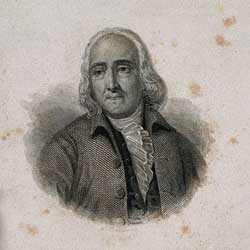 Jeremy Bentham, a name that echoes through the annals of philosophy, a beacon of utilitarian thought, a man whose life and work have left an indelible mark on the world. Born in 1748, in the bustling borough of Spitalfields, London, he was a child prodigy, a wunderkind, a boy who read multi-volume histories of England whilst still in his swaddling clothes, a lad who began his study of Latin at the tender age of three. His father, a prosperous attorney, had dreams of his son ascending to the lofty heights of Lord Chancellor. But Bentham, ever the maverick, had other plans.
Jeremy Bentham, a name that echoes through the annals of philosophy, a beacon of utilitarian thought, a man whose life and work have left an indelible mark on the world. Born in 1748, in the bustling borough of Spitalfields, London, he was a child prodigy, a wunderkind, a boy who read multi-volume histories of England whilst still in his swaddling clothes, a lad who began his study of Latin at the tender age of three. His father, a prosperous attorney, had dreams of his son ascending to the lofty heights of Lord Chancellor. But Bentham, ever the maverick, had other plans.
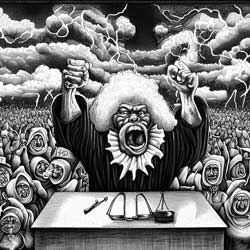 In the spirit of measured debate and with great effort to not simply dismiss the intellectual dysentery presented by the radical right, we venture into the convoluted world of mifepristone, a drug that has become the epicenter of a tempestuous debate, a battleground of ideologies, a symbol of the struggle for women's reproductive rights.
In the spirit of measured debate and with great effort to not simply dismiss the intellectual dysentery presented by the radical right, we venture into the convoluted world of mifepristone, a drug that has become the epicenter of a tempestuous debate, a battleground of ideologies, a symbol of the struggle for women's reproductive rights.
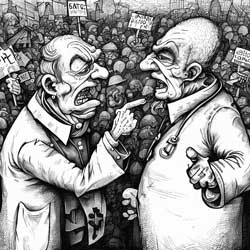 The discourse on abortion, a convoluted and contentious matter, is a tapestry woven with threads from diverse disciplines, including ethics, philosophy, medicine, and theology. While giving due consideration to the arguments advocating severe abortion restrictions, this essay will present a counter-argument, underscoring the harms inflicted upon individual women, families, and the fabric of society as a whole. The primary line of argumentation will be drawn from the utilitarian perspective, but other potent arguments will also be marshalled.
The discourse on abortion, a convoluted and contentious matter, is a tapestry woven with threads from diverse disciplines, including ethics, philosophy, medicine, and theology. While giving due consideration to the arguments advocating severe abortion restrictions, this essay will present a counter-argument, underscoring the harms inflicted upon individual women, families, and the fabric of society as a whole. The primary line of argumentation will be drawn from the utilitarian perspective, but other potent arguments will also be marshalled.
 In 1939, Bill W. wrote the The Big Book of Alcoholics Anonymous. It is the main doctrine that outlines the philosophies and methods for a path of recovery that is proven to work. My message today is for the orthodox, the unconventional, the recalcitrant, and anyone anywhere along that continuum. There are also those among us who are snuggled up in a shroud of arrogance, from before, during, or post recovery.
In 1939, Bill W. wrote the The Big Book of Alcoholics Anonymous. It is the main doctrine that outlines the philosophies and methods for a path of recovery that is proven to work. My message today is for the orthodox, the unconventional, the recalcitrant, and anyone anywhere along that continuum. There are also those among us who are snuggled up in a shroud of arrogance, from before, during, or post recovery.
 Atlas Shrugged, the behemoth magnum opus of Ayn Rand's dubious philosophical entanglement she termed 'Objectivism', sits high atop the edifice of the grand American novel - more as a gargoyle than an angel. This beloved monolith of libertarian thought, this titan of the conservative canon, is, it pains me to report, a literary debacle of the first order. It possesses the dubious quality of being as monochromatic in its characterizations as it is dogmatic in its ideological discourse.
Atlas Shrugged, the behemoth magnum opus of Ayn Rand's dubious philosophical entanglement she termed 'Objectivism', sits high atop the edifice of the grand American novel - more as a gargoyle than an angel. This beloved monolith of libertarian thought, this titan of the conservative canon, is, it pains me to report, a literary debacle of the first order. It possesses the dubious quality of being as monochromatic in its characterizations as it is dogmatic in its ideological discourse.
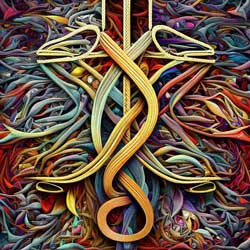 Liberalism is a prominent and multifaceted political ideology that has significantly shaped the sociopolitical dynamics of the modern world. This ideology encompasses a broad spectrum of philosophical perspectives, all sharing a common commitment to individual liberty, but diverging in their understanding of its practical implications. The various branches of liberalism—classical, social, neoliberal, green, cultural, radical, conservative, liberal feminism, liberal socialism, and libertarianism—provide a rich tapestry of thought to explore.
Liberalism is a prominent and multifaceted political ideology that has significantly shaped the sociopolitical dynamics of the modern world. This ideology encompasses a broad spectrum of philosophical perspectives, all sharing a common commitment to individual liberty, but diverging in their understanding of its practical implications. The various branches of liberalism—classical, social, neoliberal, green, cultural, radical, conservative, liberal feminism, liberal socialism, and libertarianism—provide a rich tapestry of thought to explore.
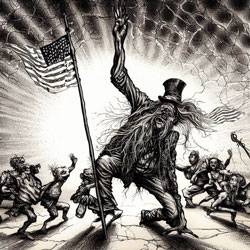 Is the Debt Ceiling, on it's face, unconstitutional? Does Section 4 of the 14th Amendment of the Constitution of the United States silence the Debt Ceiling debate?
Is the Debt Ceiling, on it's face, unconstitutional? Does Section 4 of the 14th Amendment of the Constitution of the United States silence the Debt Ceiling debate?
The music of the Constitution's words often reverberates in my mind, each note a promise, each melody an aspiration, and each harmony a testament to our shared commitment to our nation's ideals. The Fourteenth Amendment, with its Section 4, is one such melody, inviting us to reflect upon our nation's debts, their validity, and the question of the debt ceiling.
- Polarization in American Society
- Ethics in Journalism, A Cathartic Exercise
- Trump Exhaustion
- The Plummeting Credibility of SCOTUS
- Endtimes for the Rule of Law
- Elegy for He Who Was, Elon Musk
- Mental Health, A Fallacy of the Single Cause
- Common-Sense Gun Regulations, A Moral Imperative
- Redfall Falls Flat
- Russian War Crimes and Crimes Against Humanity






